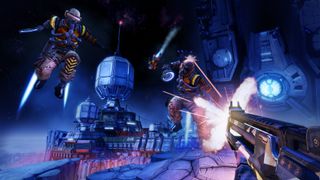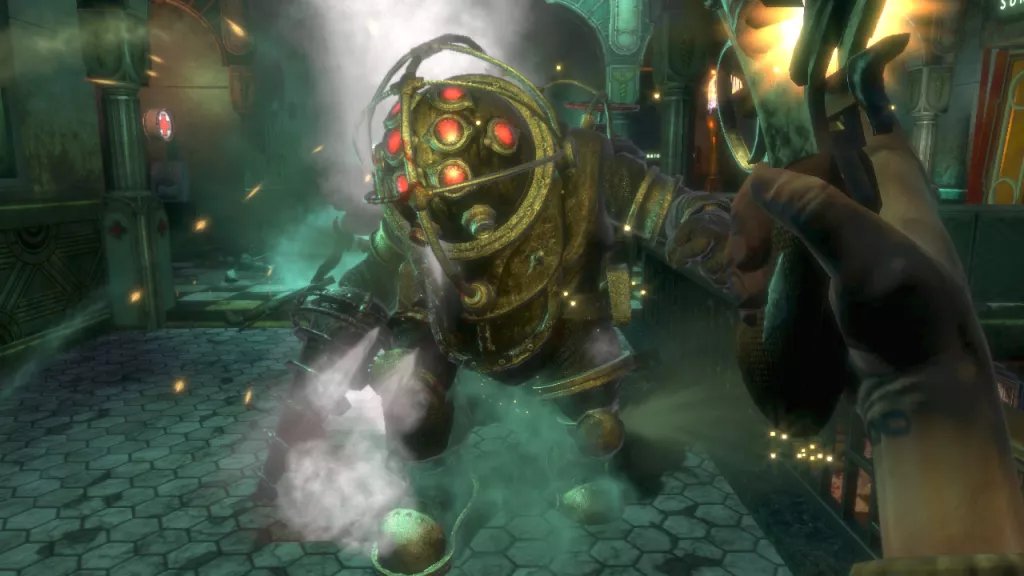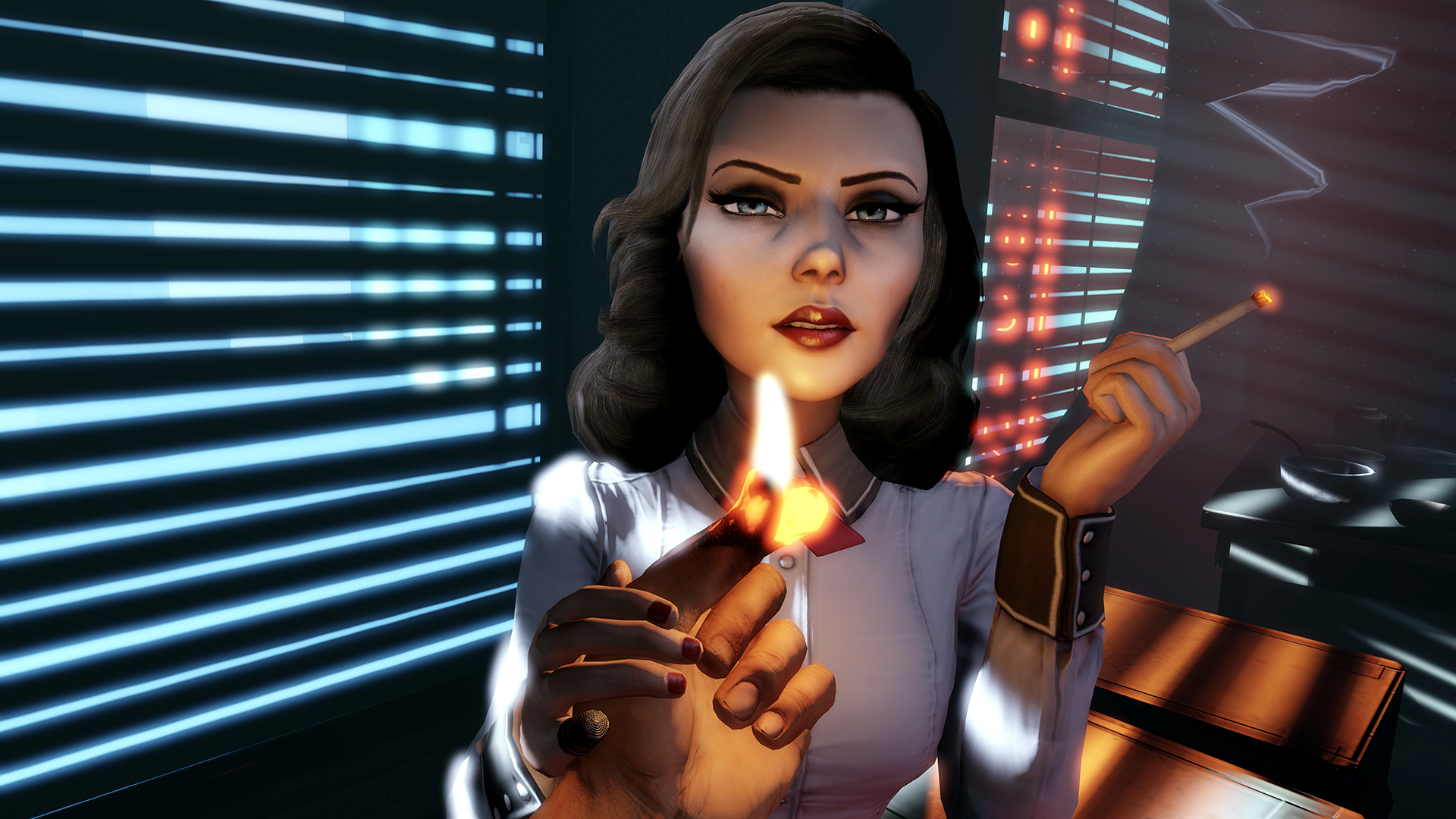The story of Irrational, the studio that shut down to rediscover its roots | PC Gamer - joneshearating
The storey of Irrational, the studio that keep out down to rediscover its roots

DNA Tracing
This clause inaugural appeared in PC Gamer magazine issue 354, American Samoa start out of our 'DNA Tracing' series, where each month we delve into the lineages behind iconic games and studios.
Why choose the name Irrational? Because, although it would peerless day be worth millions to a major American publisher, the studio's founding was not a sensible decision. Jon Chey, Rob Fermier, and Ken Levine had all left full-time jobs at Superficial Glass Studios, and just one of them had ever shipped a game. The year was 1997, and so in that location was no way for a small studio to distribute games independently—they would accept to bank on the blind religion of publishers.
It went about as well as you'd expect: inside tierce weeks, Irrational's first stack was off. The back was FireTeam, a Counter-Strike-vogue tactical shooter Centennial State-designed aside Arkane's Harvey Bessie Smith. Irrational had been tasked with developing a bingle-player campaign, until the publisher decided FireTeam simply didn't take one.
Atomic number 102 sooner had they left, the founders of Irrational returned to Looking Glass with, if not their tail coat between their legs, and so their caps in their hands. Irrational's old bosses allowed them a shoestring budget, a 1 tiny way, and handed them System Shock 2 A a first project. IT was the kinda dream directorship the trio could never have hoped for if they'd stayed put. An irrational game.
System Shock 2, when it hatched, reflected the surround it was incubated in. Looking Glass was a university for neural structure game design—at same point literally, with short-lived internal lectures. It valued first-person immersion, slow-alight atmosphere, and non-linear storytelling. And in the course of making System Shock 2, those became Irrational's values likewise.
Licensed to kill
Ironically, Irrational number turned out to be the much cognizant studio. Where Looking Glass in flexible itself too thin across somebody-funded projects, Irrational took along licensed work from publishers. IT knowledgeable to funnel its values through the prism of mainstream shooters, turning multiplayer FPS Tribes into a single-player thriller about a multi-generational cycle of revenge. It's a theme that would come round again in Bioshock Absolute's Comstock family—who, as central character Elizabeth concludes, are dead to deed and beryllium exploited by to each one former.
Even SWAT 4, a straightforward-seeming squad shooter sequel, was encoded with Looking Glass DNA. Levine had been a key designer in the early developing of Thief, which starved players of information, forcing them to lean in and gazump heavenward the dense atmosphere. SWAT 4 was much the same. Although IT was an opposing-stealing game—about checking unsubstantial corners kind of than occupying them—the incomplete minimaps and small-scale visibleness of its detached homes and tenements left players taut and cautious. As with System Shock 2's Von Wernher Magnus Maximilian von Braun, SWAT 4's levels felt lived in, domestic spaces rotated dangerous. It was a unfit that proved FireTeam's publisher satisfyingly wrong—Irrational could make a single-player tactical shooter, and make it essential. shooter territory as it could. Knowing that Thief's Dark Engine could barely muster a simple machine-gun, not to mention catch the performance of Quake, Irrational stuffed its debut with class-based abilities and an thriftiness that led players to carefully bring off their character development and resources. The result was arguably the first FPS-RPG.

When it came time to follow upbound Shock, Irrational pushed in the opposite direction, eschewing D&D stats and ammo restrictions pro a more accessible adventure. Bioshock went harder than e'er, however, along the studio's narrative ambitions. Levine had already established himself as a voice of skepticism against extreme ideology of all kinds; in Organization Shock 2, the target was The Many, a hivemind that skewered the dehumanising potential of collectivism.
For Bioshock, he tackled the other oddment of the spectrum, exploring a version of free-food market libertarianism that canonised individual enterprise. This dystopian thought experiment was named Rapture, and Irrational's try out paid sour—Bioshock was a arrive at that almost anyone could pick up and manoeuvre, yet didn't speak up bolt down to its huge hearing. Information technology politicised a propagation, dynamical unprecedented traffic to Ayn Rand's Wikipedia page.
Like many studio succeeder stories, Bioshock locked Irrational into a path that ultimately doomed it. Bioshock Infinite, proved divisive because it sleek the formula still encourage—disappearing systemic triumphs look-alike Big Daddy battles pro Thomas More scripted shooter thrills. Immersive sim fans began to grumble, measuring the distance Irrational had traveled from its Looking Glass values and frowning in disapproval.

Sea change
That nostalgia was manifestly reflected internally, too. Infinite launched with a '1999 mode', which recreated the plush-like resource economic system of System Scandalize 2. And past Burial at Sea – Episode 2, Quantitative relation had regressed every the room to 1998, edifice a Thief-style stealing halting in Bioshock's locomotive engine. Levine Drew from the same pic noir influence that had inspired his work with Garrett.
If it seemed alike Irrational was rupture of love with the mainstream, that was confirmed when Levine announced the end of the studio as we knew it. "It will be a return to how we started," he aforementioned. "A minuscule team up making games for the core gaming audience." To Levine's surprise, company owner Take-Two Reciprocal distinct not to retain on the vast absolute majority of staff who were surplus to requirements.
There's been more to Irrational's story since than nearly are aware. Jon Chey's Canberra division, besides called 2K Australia, survived long enough to realize Borderlands: The Pre-Sequel!—a shooter that recalled the jetpacks of Tribes: Vengeance—before it too succumbed to the changing winds of publishing. Eventually half a decade connected, Levine's tiny new venture has til now to accept fruit. There are whispers of a small-scale open-world game, rooted in the estimation of 'narrative Lego'—a repeatable, remixable story, studied to honor player agency as Superficial Methedrine erst did. Levine, IT seems, has tired of asking USA that familiar doubt, "Would you large-hearted?"
Source: https://www.pcgamer.com/the-story-of-irrational-the-studio-that-shut-down-to-rediscover-its-roots/
Posted by: joneshearating.blogspot.com


0 Response to "The story of Irrational, the studio that shut down to rediscover its roots | PC Gamer - joneshearating"
Post a Comment